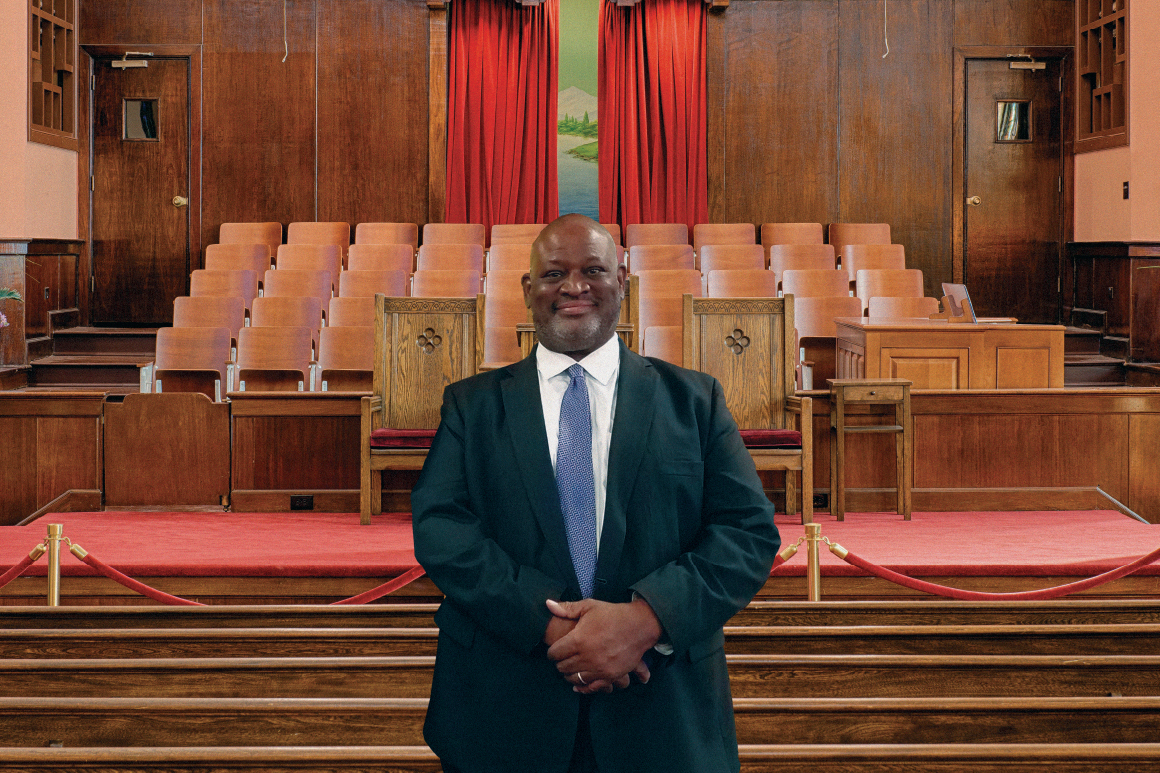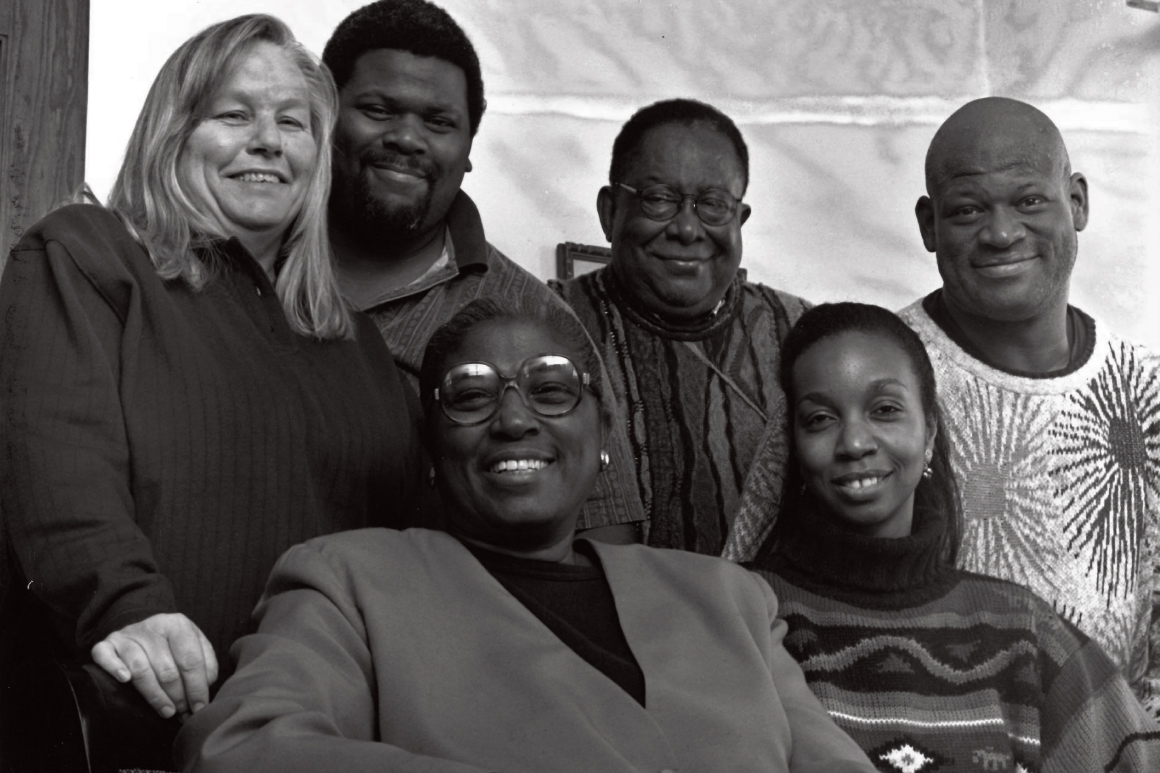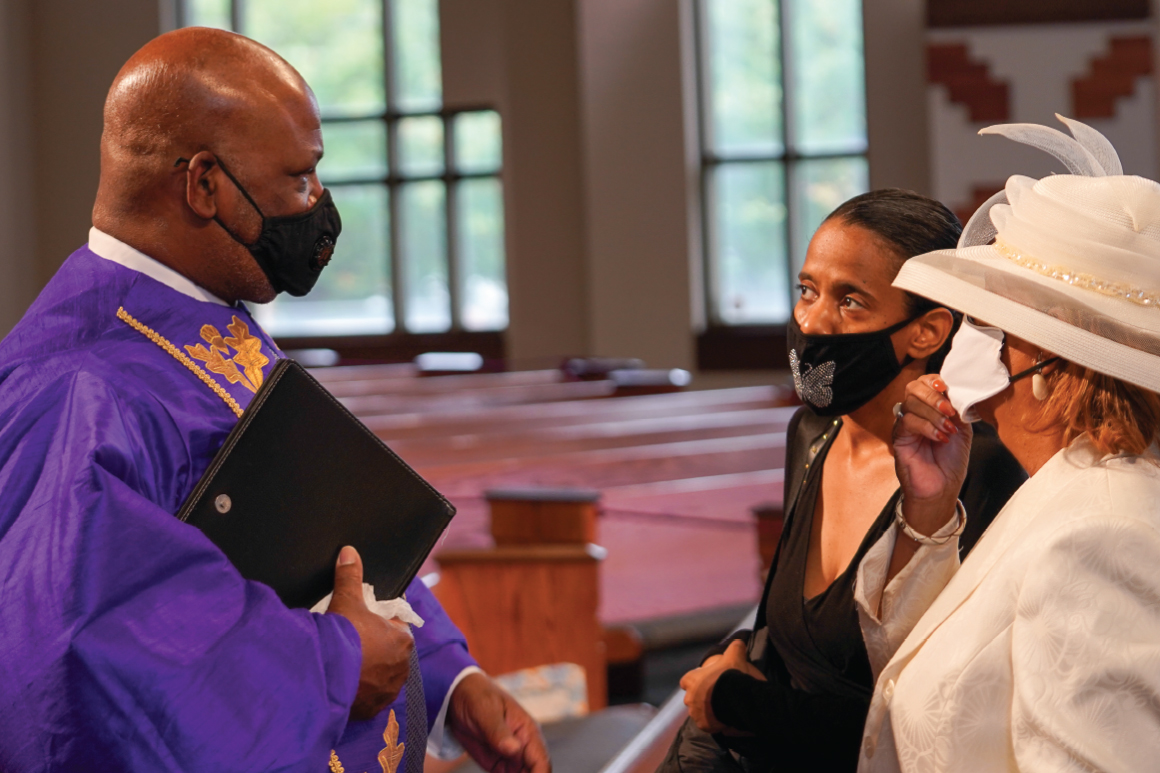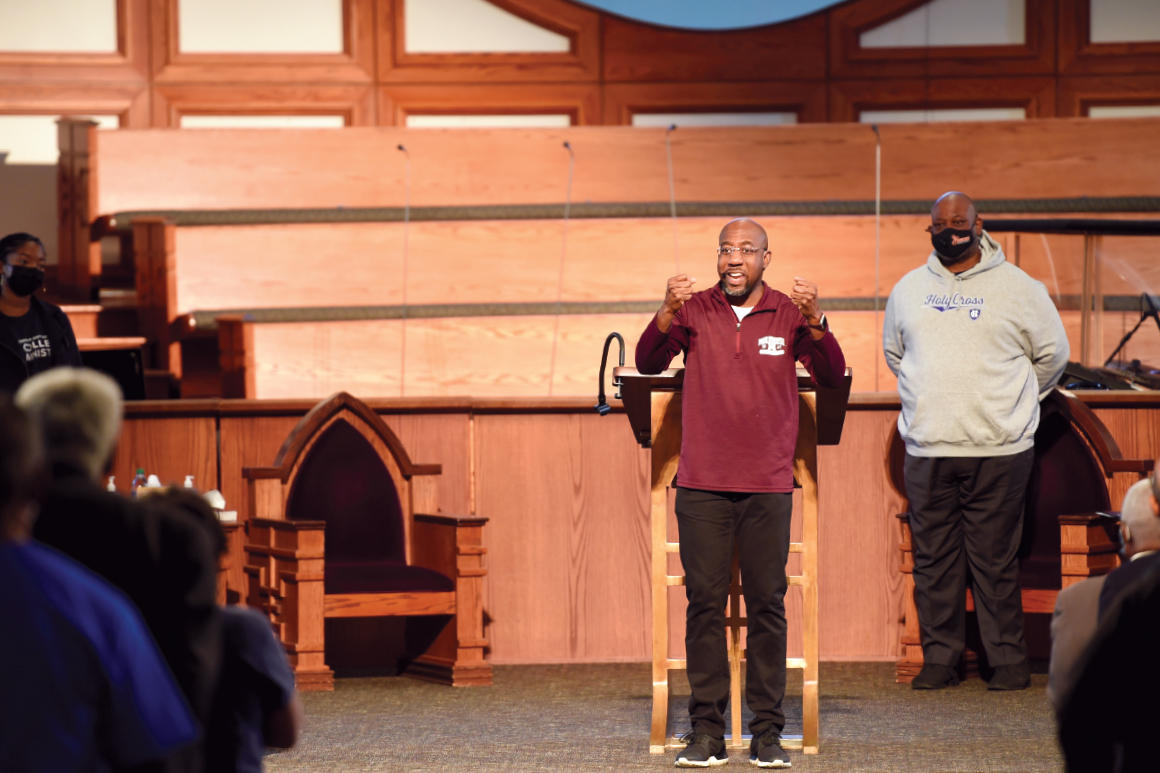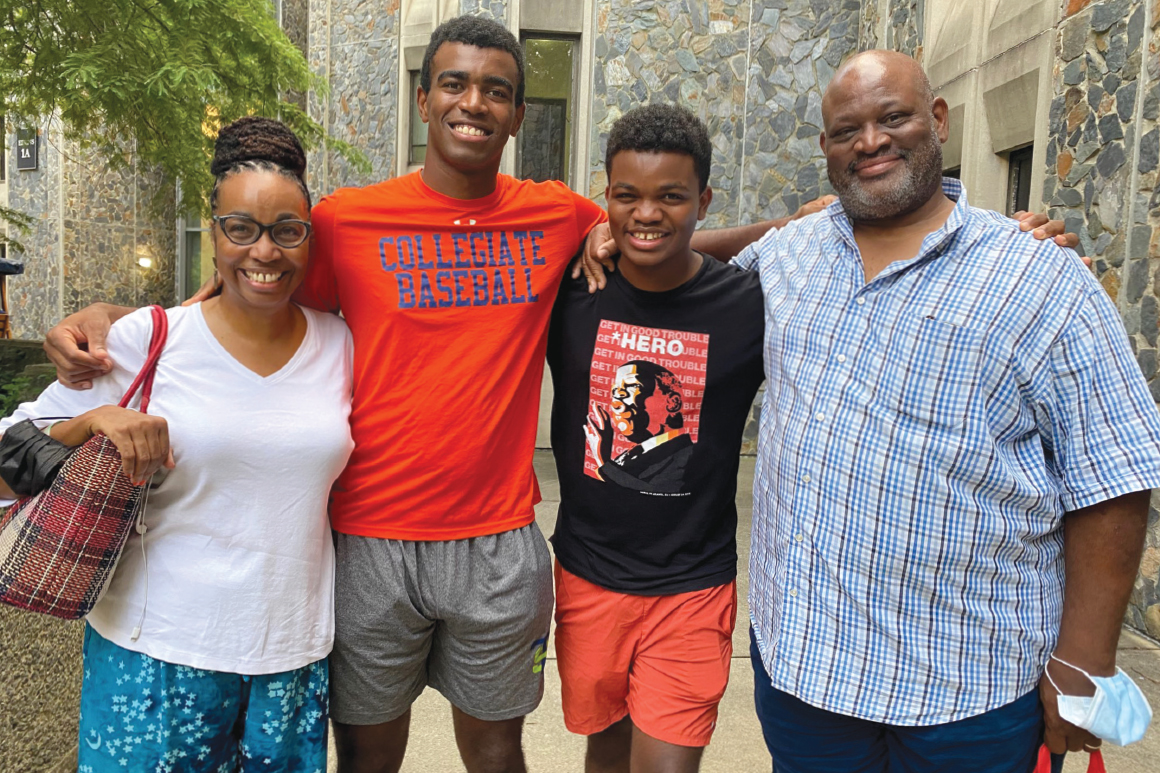Ask Rev. Dr. John Vaughn '82 and he'll tell you himself: "I do not fit the stereotype of when people think of the traditional Black pastor." From his youth, when he worshipped at the First Baptist Church of Worcester, Rev. Vaughn always found comfort and acceptance at church. After graduating from Holy Cross, he enrolled in seminary at the Pacific School of Religion in California. Since then, Rev. Vaughn has used his training not to preach from a pulpit, but to lead operations at churches, nonprofits and organizations working toward racial and social equity.
Today, Rev. Vaughn serves as the executive pastor of the historic Ebenezer Baptist Church in Atlanta, which was the church of Rev. Dr. Martin Luther King Jr., and is part of the Martin Luther King Jr. National Historical Park. As executive pastor, a role he compares to a chief operating officer, Rev. Vaughn not only oversees the daily operations of the church, but also strives to share with others how this historic congregation shaped Dr. King and other leaders for justice.
"Dr. King didn't just emerge; he came out of a context, of a family that loved him and that had a certain set of values. He came out of a congregation that really helped shape who he was," Rev. Vaughn says. "And Ebenezer is that place; it's in the stone, in the soil of the place."
And, like Dr. King, Rev. Vaughn emerged out of his own context: his family and church community in Worcester, an education at Holy Cross and in seminary, and as a Black man in America.
Social Justice Takes Root
He grew up in Worcester, the son of Holy Cross icon the late Ogretta McNeil, associate professor emerita of psychology: the first Black woman on the College's faculty, the first woman hired to a tenure-track position in the psychology department and a leader in diversity and inclusion efforts on campus as founder of the ALANA Program. He was raised by McNeil and his stepfather, Kingsley McNeil, an immigrant from Jamaica, and says he had strong Black roots in his extended family, including grandparents he spent summers with in Washington, D.C., and Louisville, Kentucky. Rev. Vaughn remembers a lively house, full of people from all walks of life, between family, friends and his mother's colleagues from Holy Cross. "In the house that I grew up in, in our living room, you were welcome," he says. "And in so many ways, that sense of hospitality and acceptance set a tone for me: Justice is manifesting what it means to really love everybody."
McNeil set that tone of acceptance at home and at work. A pioneer on campus at Holy Cross, she was determined to help students of color advance and was — and is still — lauded for her support of students of color.
"Supporting Black students, making sure that they did well and had the support they needed, that was something that she always really cared about," he says. "I'm grateful Holy Cross gave her a place to find her voice, to provide those kinds of spaces and support things that she had been passionate about her whole life. She was also active in different community organizations. It's funny, I was less clued into that as a kid, I think, but somehow that level of commitment to community made its way by osmosis into me and has been part of shaping my own call to ministry."
Because Holy Cross was his mother's place, it is the backdrop for many of Rev. Vaughn's childhood memories: the birthday party at a tailgate on Freshman Field before a football game; season tickets to basketball games at the inaugural season in the Hart Center, where he watched Marty Halsey '76, Peter Beckenbach '79 and Billy Doran '77 play; and spending time in his mother's office in Alumni Hall, where the psychology department was located in the '70s.
When it came time to apply to college, Rev. Vaughn figured he'd look beyond Mount St. James and visited several other Jesuit schools. But, in the end, he submitted his early decision application to Holy Cross — without telling his mother, who found out from the admissions office.
"I'm not sure I can even tell you exactly what it was that made me choose Holy Cross. At its core, the idea of a liberal arts education made a lot of sense to me," he says. "And I think there was probably a wonderful degree of familiarity. It was a feeling and then I just decided to go for it. It was the right thing for me at that moment in my life."
A French major, Rev. Vaughn jokes, "If I could have graduated undecided, I would have, because I really didn't know what I wanted to do."
He headed for seminary thinking he might become a high school religion teacher, but midway through his time there, he found a new path. During a mid-year check-in meeting with one of his professors, the pastor where he interned and two of his classmates, they helped him envision a path for his future.
"These folks said, 'You have a call to ministry, but it's going to look a little different. You're going to work crossrace and in community engagement, maybe in urban settings. You're going to work across faiths,'" he remembers. "These were the elements they were seeing in me, and I literally felt the power of the Holy Spirit at that moment and felt this call."
In the years since that conversation, Rev. Vaughn has lived that call quite like his mentors predicted. He's worked for the Twenty-First Century Foundation in Harlem, an organization that advocates for Black community change. As executive director of the Peace Development Fund, he facilitated training and assistance for grassroots peace and justice community organizing across the U.S. At another historic, nationally known congregation, the Riverside Church in New York City, he oversaw and led the Church's education, social justice and social service programs. In the mid-to-late '80s, he worked as executive director at nonprofit East Harlem Interfaith during the height of the AIDS and crack epidemics.
Reflecting as A Black Man in America
Seminary was where Rev. Vaughn experienced his call to serve others, and it was also a time when he reflected on his own identity: "I really began to dig deeper into, 'So what does it mean to be a Black man from Worcester, Massachusetts, who is now also called to the ministry?' and all the complexities of that."
It's a reflection that he's engaged in throughout his life, and especially as the father of two sons, James, a sophomore at Duke University, and Caleb, a high school sophomore at the Professional Performing Arts School. In 2015, he wrote about the topic for HuffPost, in the wake of protests after the deaths of Michael Brown and Eric Garner in police custody.
"There is a commonly held belief among some that there is one Black experience and one Black community. Not only is this completely untrue, it's harmful," he wrote. "We're not a homogenous community, but are all in this together. I'm using my position as a Black faith leader to work with people of many faiths to powerfully and peacefully raise their voices to transform our justice system."
For Rev. Vaughn, faith and justice are inextricably linked: "Faith for me is that constant sense of both grounding and challenge at the same time. If you take God at God's word, then you have to care about what's happening to people who aren't being treated fairly or are seen as less than," he says.
At the Spiritual Home of Martin Luther King Jr.
Ebenezer Baptist Church, which Rev. Vaughn joined in early 2020, is a historical landmark, global icon and active church community. Founded in 1886, it grew to serve as a supportive faith community in Atlanta and a symbol for justice and equality across the country. Dr. King's father, Rev. Martin Luther King Sr., served as pastor of Ebenezer for 44 years. Dr. King himself was a co-pastor from 1960 until his assassination in 1968. Today, the church is home to a congregation of more than 6,000 people, housed in a new building constructed in 1999, across the street from the historic church where both Kings preached. Sen. Rev. Dr. Raphael G. Warnock, the first Black U.S. senator from Georgia, leads Ebenezer Baptist as senior pastor.
"Ebenezer is not just the church of Dr. King or the church of Daddy King, but it is a church that has within its DNA a commitment to deep faith, deep justice, a sense of inclusion and what it means to be 'America's Freedom Church,'" Rev. Vaughn says. "People come from all over the world to take pictures of our blue sign outside the heritage building [the original church building]. When you think of the power of that, it's the power of the congregation that helped make that happen."
Rev. Vaughn found his path leading to Ebenezer thanks to his connection with Rev. Warnock, who was at Union Seminary with Rev. Vaughn's wife, the Rev. Dr. Kimberleigh Jordan. Revs. Vaughn and Warnock, who have known each other for more than 20 years, reconnected in 2018 while working on a national conference focused on a multifaith response to mass incarceration. At the time, Rev. Vaughn was the executive vice president at Auburn Theological Seminary, a leadership development and research institute for faith leaders working for justice. But he was also feeling like it was time for a change that might include a move out of New York City, where he and his family had lived since the '90s.
"I feel like the right person in the right place at the right time," says Rev. Vaughn, who oversees all of Ebenezer's ministries, including worship, music, mission and outreach, social justice, pastoral care, church life and fellowship, development — including heading a $20 million capital campaign — and fiscal management. "Ebenezer has really needed an executive pastor, because a lot has been on Pastor Warnock's shoulders. I was one of the important pieces for him to be able to take the Senate run, because he needed someone he could trust and someone who was good at building and managing the internal parts of the church."
Working at the spiritual home of Dr. King wasn't on Rev. Vaughn's radar back in 2016, when he quoted Dr. King in Holy Cross Magazine. He was interviewed as a recipient of the 2015 Sanctae Crucis Award, the College's highest non-degree honor, in recognition of his interfaith efforts to address racial injustice and economic inequality. Asked what keeps him going in moments of hopelessness, he cited Dr. King's quote: "The moral arc of the universe does bend towards justice."
Nearly five years later, in February 2020, Rev. Vaughn came to Dr. King's church, working across the street from where the man who inspired him grew up and preached.
"Being committed to social justice is part of what is means to be a Christian, and Dr. King embodied that for me, and for so many. He was the primary influence on them and on being a Black man who stood in that Christian space," Rev. Vaughn says.
As he helps shepherd America's Freedom Church into its future, Rev. Vaughn remains committed to the sense of social justice that he learned from Dr. King — in church and in his childhood home. "Our house was the gathering place," Rev. Vaughn says. "It was the place where people of all races would show up in our living room. It was this eclectic group of people, both racially and class-wise. It was, if you will, a glimpse of the kingdom of God — that sense that folks could coexist in the same space, connect and enjoy each other. I look back on that as the norm, and it certainly played a role in my understanding of what it meant to do ministry and to work across lines of difference."
Written by Maura Sullivan Hill for the Winter 2022 issue of Holy Cross Magazine.
About Holy Cross Magazine
Holy Cross Magazine (HCM) is the quarterly alumni publication of the College of the Holy Cross. The award-winning publication is mailed to alumni and friends of the College and includes intriguing profiles, make-you-think features, alumni news, exclusive photos and more. Visit magazine.holycross.edu/about to contact HCM, submit alumni class notes, milestones, or letters to the editor.
